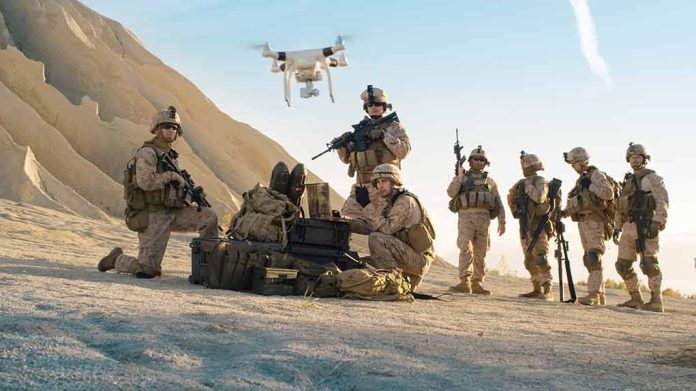
Tucker Carlson’s pointed criticism of Mark Levin’s White House lobbying for war with Iran has ignited a ferocious public clash between the conservative media titans, with Carlson warning President Trump that military action could derail his presidency and potentially trigger a global conflict.
Key Takeaways
- Tucker Carlson claims Mark Levin personally lobbied at the White House for military action against Iran, warning that such a conflict could end Trump’s presidency
- Carlson disputes claims about Iran’s nuclear capabilities, arguing there’s no credible intelligence suggesting an imminent nuclear threat
- The dispute escalated when Levin accused critics of using “neocon” as an anti-Semitic pejorative, which Carlson forcefully rejected
- Carlson warns that war with Iran could expand into a global conflict due to Iran’s alliances with Russia and China
- The clash highlights a fundamental division in conservative foreign policy between interventionists and those favoring restraint
War Hawks in the White House
Tucker Carlson has launched a scathing critique against fellow conservative commentator Mark Levin, accusing him of actively promoting military action against Iran in direct conversations with President Trump. In a recent broadcast, Carlson made the explosive claim that Levin was personally advocating for war during White House meetings. The allegation represents a significant escalation in the ongoing feud between the two influential conservative voices, particularly as President Trump weighs responses to regional tensions involving Iran and its proxies.
“Mark Levin was at the White House today, lobbying for war with Iran,” said Tucker Carlson, former Fox News host.
Carlson’s criticism centers on what he characterizes as a dangerous push toward military confrontation without sufficient justification. He dismissed claims about Iran’s nuclear weapons program as lacking credible evidence, suggesting the real agenda behind calls for military action is regime change rather than addressing an imminent threat. This position directly challenges the hawkish stance that Levin and others have adopted, which emphasizes the need for decisive action against Iran’s nuclear ambitions.
The Nuclear Threat Debate
Central to the disagreement between Carlson and Levin is the assessment of Iran’s nuclear capabilities and intentions. Carlson contends there is no reliable intelligence indicating Iran is on the verge of acquiring nuclear weapons, drawing parallels to the faulty intelligence that preceded the Iraq War. He argues that Iran understands the consequences of pursuing nuclear weapons, pointing to the fate of Libya’s Muammar Gaddafi, who was overthrown after abandoning his nuclear program. This reasoning forms the basis of Carlson’s opposition to military intervention.
“An attack on Iran could very easily become a world war. We’d lose,” said Tucker Carlson, expressing concern about potential global escalation.
Levin, conversely, has consistently portrayed Iran’s nuclear program as an existential threat requiring forceful response. He has frequently highlighted Iran’s support for terrorist organizations throughout the Middle East and its stated hostility toward both Israel and the United States. The stark difference in threat assessment between the two commentators underscores a fundamental divide in conservative foreign policy thinking – one prioritizing military readiness and the other emphasizing diplomatic caution and military restraint.
Political Ramifications for Trump
Carlson’s most politically charged warning was directed at President Trump himself, suggesting that launching military action against Iran would betray his core supporters and potentially end his presidency. This argument rests on the premise that Trump’s electoral success was built partly on promises to avoid new foreign entanglements and focus on domestic priorities. The political calculation Carlson presents is straightforward: Trump’s base expects him to resist the interventionist policies that characterized previous administrations.
Mark Levin was at the White House today, lobbying for war with Iran. To be clear, Levin has no plans to fight in this or any other war. He’s demanding that American troops do it. We need to stop Iran from building nuclear weapons, he and likeminded ideologues in Washington are…
— Tucker Carlson (@TuckerCarlson) June 5, 2025
The dispute between Carlson and Levin took an unexpected turn when Levin suggested that the term “neocon” is frequently used as an anti-Semitic dog whistle. This accusation came after Trump’s Middle East envoy Steve Witkoff commented that the “neocon element believes that war is the only way to solve things.” Levin’s assertion that such terminology targets Jewish advocates of strong foreign policy drew immediate ridicule from Carlson, who pointed out that Witkoff himself is Jewish, making the accusation particularly absurd.
Broader Implications for Conservative Foreign Policy
This public feud between two influential conservative voices represents more than personal animosity – it highlights a fundamental division within Republican foreign policy circles that President Trump must navigate. On one side stand traditional hawks who advocate for military strength and intervention when American interests or allies are threatened. On the opposite side are those who favor restraint, skeptical of military solutions and wary of entanglements that could drain American resources without clear benefits.
“We’ve reached peak crazy,” said Tucker Carlson, reflecting his frustration with what he views as reckless war advocacy.
Carlson’s warning about Iran’s alliances with Russia and China adds a sobering geopolitical dimension to the debate. He suggests that military action against Iran could trigger responses from these major powers, potentially escalating into a broader conflict with devastating consequences. This concern about wider entanglements reflects the complexity of modern geopolitics, where regional conflicts can quickly expand due to interconnected alliances and interests among global powers.














